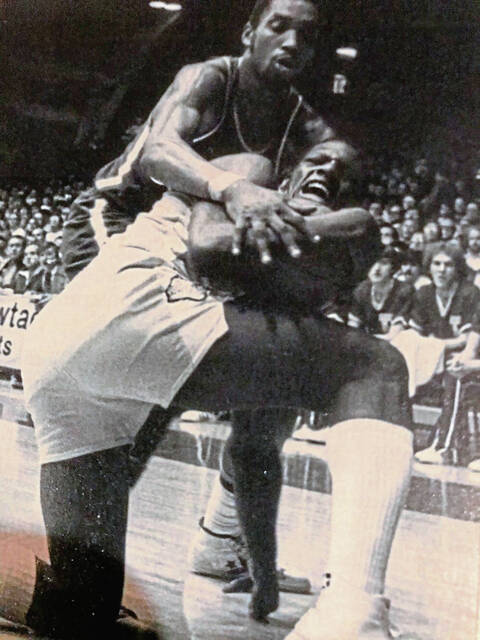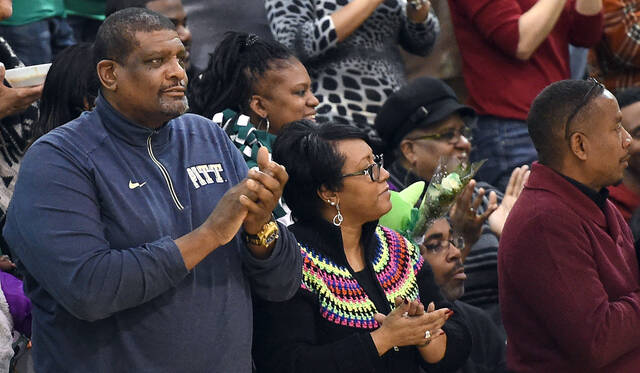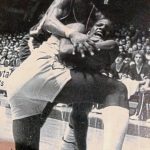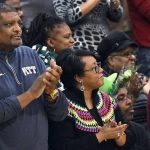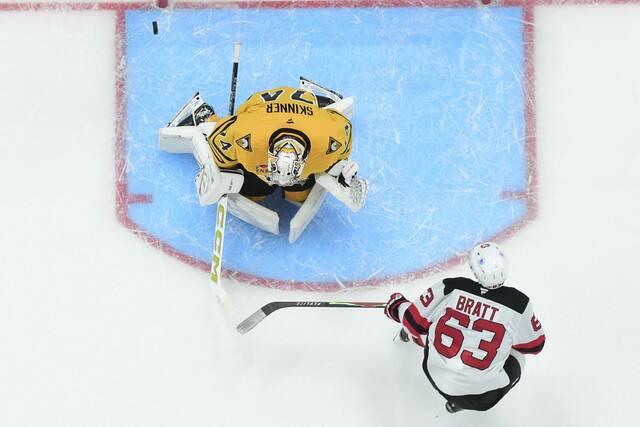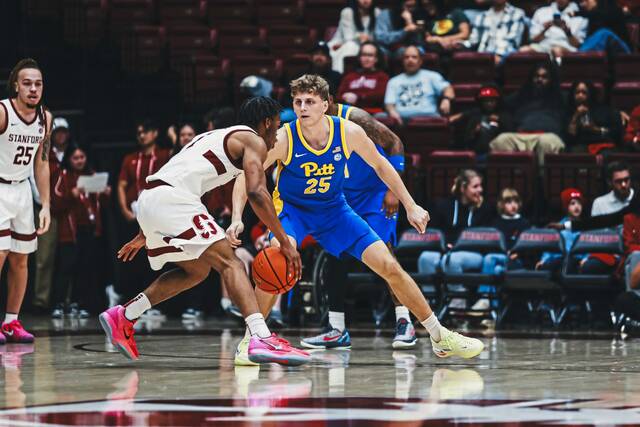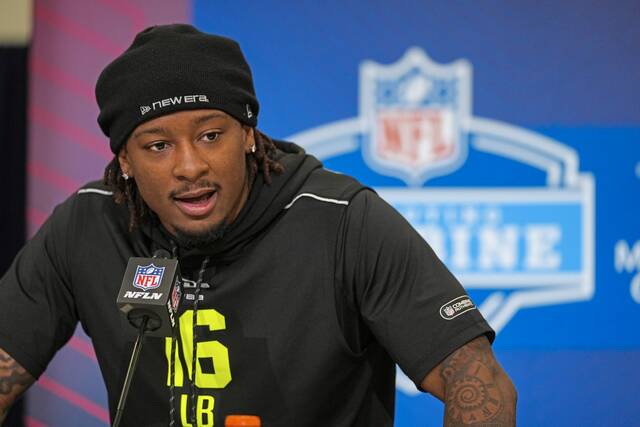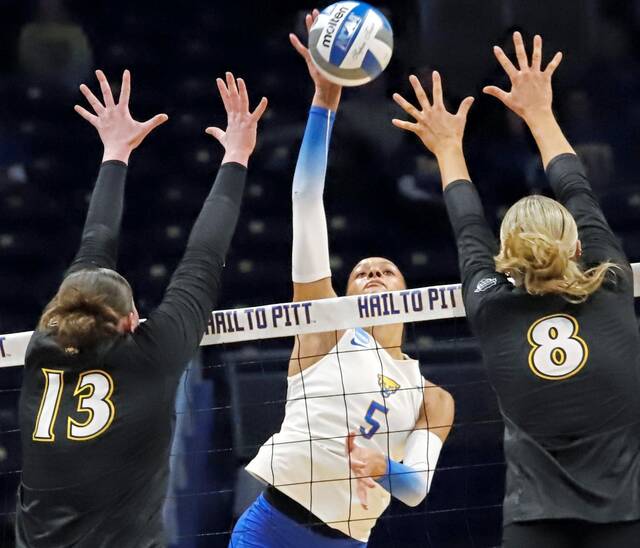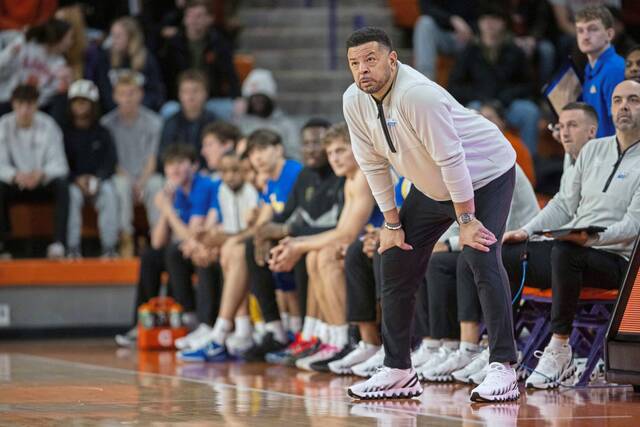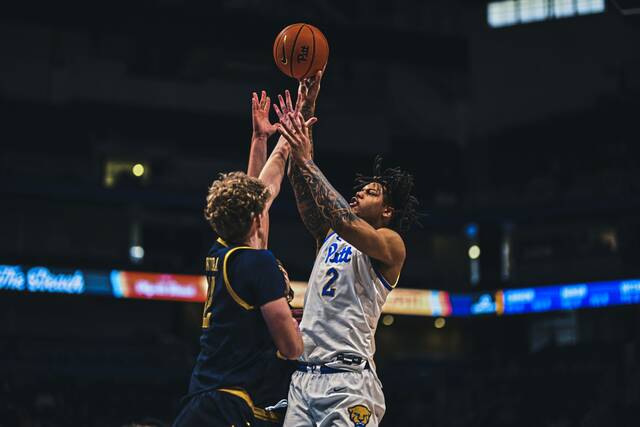Sam Clancy works in the same building as Jeff Capel. It’s inevitable that Pitt basketball, past and present, cross paths occasionally.
One day this season, in the midst of Pitt’s historic recovery from oblivion, Clancy walked up to the coach and announced, “I’m a proud basketball alumni. I’m walking around like a peacock spreading his feathers.”
No one has exhibited more loyalty to Pitt than Clancy, who spurned more than 200 scholarship offers 46 years ago to help repair the program and spent the past 14 as director of Pitt’s Varsity Letter Club.
The 2022-23 season is special to every Pitt fan, especially when they consider how far it has soared above the ashes of the past six seasons. After the 99-82 victory Saturday against Syracuse, the team became just the sixth in school history to improve by at least 10 victories from the previous season.
The others:
• 1927-1928: Legendary coach Doc Carlson liked to tell people that his team’s goal was to “win ‘em all,” according to author Sam Sciullo’s book, “100 Years of Pitt Basketball.” This one did, winning all 21 games — Pitt’s only undefeated team — after a 10-7 season in 1926-27.
• 1973-1974: A school-record 13-game improvement (25-4 from 12-14) and Pitt’s first Elite 8 appearance under coach Buzz Ridl.
• 1977-1978: Freshman Clancy’s slash line (points/rebounds/blocks) : 378/327/53 while Pitt won 16 games after a 6-21 mark the previous season.
• 1986-1987: Pitt went from 15 to 25 victories a year before Jerome Lane shattered the backboard.
• 2001-2002: The third of the Ben Howland/Jamie Dixon teams, this one going from 19 to a then-school record 29 victories.
Pitt won 11 games last season — making the six-year average 12.5 since Dixon’s departure in 2016 — but Capel’s reconstruction project has netted a 21-8 overall record this season (14-4 in the ACC) and what appears at the moment to be a lock on an NCAA Tournament berth for the first time in seven seasons. Pitt will play at least three more games before Selection Sunday on March 12.
“Jeff’s done a great job,” Syracuse coach Jim Boeheim said Saturday night after the game. “Last year, they were trying to get a new coach, weren’t they?”
When senior Greg Elliott was told recently that he and his teammates were on their way to making history, he all but shrugged his shoulders.
“That’s what we were brought here for,” he said. “We knew we were coming in and going to make noise this year.”
Yet, Capel and his transfers have done it in a way that would have been considered unorthodox not only in Clancy’s day, but perhaps only five years ago.
Pitt’s eight leading scorers either started their collegiate careers elsewhere or were in high school last year (in the case of the Diaz Graham twins, freshmen Guillermo and Jorge). Six of them weren’t even on the team last season, and a seventh (Nike Sibande) missed all 32 games with a knee injury.
What’s most astounding is that Capel has done it after losing three scholarship players — John Hugley, William Jeffress and Dior Johnson — who were expected to contribute.
“These guys right here,” said Clancy referencing the current team, “they enjoy playing with each other, which is different from, I think, teams in the past.
“I’m just saying this from me. I didn’t hear it from a coach or anybody like that. When you look at other teams in the past, they were selfish. Always, I, I, I. The guys right now are about we, we, we, the team, team, team. That’s why I think we are playing well.
“Nobody cares who gets the glory as long as we get the win. You’re thinking about the NBA, but you can’t win any games here at the University of Pittsburgh.”
After a decorated career at Fifth Avenue/Brashear High School, Clancy was a freshman on the 1977-78 team that won 16 games. Pitt won six the previous season.
“Because I was a high-profile, high school athlete, they figured we had a chance, especially somebody to help get the boards,” said Clancy, who played four seasons and is Pitt’s all-time leading rebounder (1,342). “I wanted to help Pitt win. I remember telling people, ‘Hey, that’s why I’m staying home.’
“I grew up (at the corner of Bedford and Roberts Streets in the Hill District) watching Billy Knight, Kirk Bruce, Mickey Martin, Keith Starr. Then, Tony Dorsett on the football field, so I wanted to stay home. It was important for my mom and my father and the Hill District.”
In contrast to many of the current players who didn’t know Capel before he started recruiting them a year ago, Clancy met then-Pitt coach Tim Grgurich in the eighth grade. Grgurich often drove through the Hill to keep up with young players such as Clancy and others.
“We were always outside,” Clancy said, “and all the Pitt coaches would ride by (and shout), ‘Hey, Mr. Clancy (Sam’s dad). What’s going on?’
“Grgurich knew every family member’s name. I’m not (just) talking about brothers and sisters and mom and dad. I’m talking about my aunts, my uncles, my cousins, everybody.
“Today, I don’t think coaches have the opportunity to (know) the family like that because kids are in and out.”
What’s also different is that the 1976-77 team had several holdovers, including Larry Harris, Pitt’s third all-time leading scorer, Terry Knight and Wayne Williams.
It was the same situation in 1973-74 when Pitt improved from 12 to 25 victories. Braddock’s Billy Knight, a consensus second-team All-American, Martin, Tom Richards, Bruce and Starr were among nine players who returned. Pitt ended the season nationally ranked (No. 16) for the first time.
Before this year, the most recent Pitt team to improve by 10 victories was the 2001-02 group. Julius Page was the second-leading scorer on that team and was one of seven key contributors who returned.
Page remembers watching Pitt play St. John’s when he was a high school senior in Buffalo, N.Y., and it wasn’t a pretty sight. “They were losing by 30 points at halftime,” he said.
He enrolled, anyway. “I was already committed and my mind was already made up,” he said.
Pitt had a good team the previous season — Howland’s second — and it won a game in the NIT. But leading scorers Ricardo Greer and Isaac Hawkins exhausted their eligibility, and the team’s mindset changed for 2001-02, Page said.
“My freshman year, for example, I personally didn’t buy a lot into watching film and things of that nature,” he said. “We didn’t do it in high school. I used to hate watching film.”
Page said he and others actually considered transferring.
“Absolutely. Making the selfish move, that was me thinking of myself,” he said. “I got some really good advice to give it one more year to see how things worked out. The rest is history. The second year we had 29 wins. There was no need to go anywhere.”
Page said the team developed a more physical, defensive mindset after a 79-57 loss to Boston College in the ‘01 Big East championship game.
“Boston College kicked our behinds,” he said. “Another thing we didn’t take seriously that year was hitting the weight room. Boston College beat up on us and made us realize we had to get stronger.”
Most important, Brandin Knight became a scorer and playmaker while Page stepped up his offensive game.
“So, instead of just throwing into Ricardo in certain spots and watching him operate,” Page said, “our offense became more fluid because Brandin was a guy who was able to penetrate off the dribble and now (hit) Donatas (Zavakas) for open 3s and make more plays.”
The result: Pitt reached the Sweet 16, starting a string of 13 NCAA Tournament berths in 15 seasons.
Page still lives in the area — his daughter, Perri, was a star at Chartiers Valley — and keeps an eye on the Panthers.
“They ran into a lot of misfortune in previous years that was kind of out of coach Capel’s hands, in my opinion,” he said. “I think he did a really good job in the portal this year, really trying to understand that the game is more of a stretch game.”
He said players such as Blake Hinson and Sibande, who previously sat out long periods of time, probably appreciate the game more.
“My daughter just got hurt (at Columbia), and I’m telling her the same thing. When you are robbed from the game for a significant amount of time, it’s going to make you really appreciate it when you come back.”


